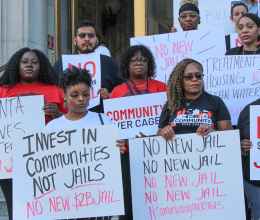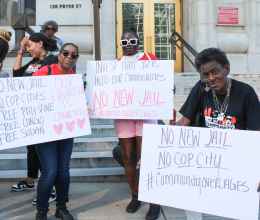The ACLU of Georgia opposes SB 63 in the strongest possible terms.
This bill creates a two-tiered justice system where your wealth determines your culpability by adding nearly every conceivable crime of poverty to the list of bail-restricted offenses. Scholarship on this topic reveals that such a system compels the innocent to plead guilty and for longer and harsher sentences than those who bonded out. There is absolutely no public safety interest in having innocent people plead guilty to offenses they did not commit simply so they can get out of jail and not wait indefinitely in often inhumane conditions for their case to resolve.
This is not the first bail-restricted offense bill to come before the General Assembly. If proponents of this bill appeal to imagery of violent felons being released on their signature, please note what offenses are already bail-restricted. The predominant additions in this bill are offenses related to poverty and substance abuse. Offenses that real world criminal practice expertise tells the ACLU of Georgia are offenses that rarely result in actual incarceration. What interest is being served by having individuals who are too poor to afford bond filling our local jails until their cases are resolved if they will likely be released into the community as soon as they plead guilty?
Worse still, this bill removes the only meaningful relief valve to wealth based detention. When the sponsor of this bill was asked what would happen to individuals who were forced to remain in custody pending trial because they were too poor to afford bond, the sponsor responded that community groups could put the money together to have the individual released. We are not as optimistic as the author that the untold number people impacted would allow for community groups to eliminate wealth based detention from the onset. But to the extent it would have been possible, Section Four of this bill inexplicably criminalizes bail funds. The only relief valve the sponsor of this bill could point to is made a misdemeanor by this bill.
As you are considering this bill please remember that approximately 85 percent of individuals charged with a criminal offense are legally indigent. For many of these individuals, especially those who are charged with crimes of poverty, the only reasonable bond will be a signature bond. Georgia law requires judges to consider an individual’s ability to pay when setting bond. We are very concerned that judges will be placed in the position of violating state law by setting a signature bond, or violating state law by not properly considering an individual's ability to pay. This bill leaves no good options.
SB 63 should be rejected outright. The list of bail-restrictions is already long enough, and was just added to last year already. The full effects of wealth based detention from that bill have not even been able to be fully explored yet. Adding to the list, especially when the additions are crimes of poverty and substance abuse, without a firm justification (which we have yet to hear) makes absolutely no sense at this time.
This bill dramatically expands the amount of individuals who must post a cash bond to be released, and slows down the process for UJRs on misdemeanors and ordinances.
Misdemeanors and Ordinances
Section One of the bill prohibits counties from releasing individuals for misdemeanors and ordinance violations before the accused sees a judge. There are limited carve-outs, including violations of state or local law which do not carry the possibility of jail time. This would require individuals arrested for something as innocuous as a city ordinance violation to remain in custody for 2 or 3 days to be considered for a UJR. We know that individuals who remain in jail for just 2 or 3 days instead of being released immediately are more likely to re-offend. This bill actually makes Georgia less safe by driving up recidivism.
The bill also, for reasons not immediately apparent, requires courts of inquiries for misdemeanor cases to set a “sufficient bond” rather than a reasonable bond, and specifically prohibits bonds to be accepted other than provided for by state law.
Bail-Restricted Offenses
Bail-restricted offenses are those in which a judge cannot release a person on their own signature, and must post bond. This bill removes the distinction between misdemeanors and felonies for the purpose of bail-restricted offenses, so that any offense covered, whether a misdemeanor or felony will be bond restricted. Additionally the bill adds the following laundry list of offenses to the bail-restricted list:
- Reckless stunt driving, as described in Code Section 40-6-390.1;
- Promoting or organizing an exhibition of drag races or laying drags, as described in Code Section 16-11-43.1;
- Laying drags, as defined in Code Section 40-6-251;
- Reckless driving, as described in Code Section 40-6-390;
- Fleeing or attempting to elude a police officer, as described in Code Section 40-6-395;
- Obstruction of a law enforcement officer, as described in Code Section 16-10-29;
- Criminal trespass, as described in Code Section 16-7-21;
- Theft by taking, as described in Code Section 16-8-2;
- Theft by deception, as described in Code Section 16-8-3;
- Theft by extortion, as described in Code Section 16-8-16;
- Destruction, removal, concealment, encumbrance, or transfer of property subject to security interest, as described in Code Section 16-9-51;
- Bribery, as described in Code Section 16-10-2;
- Purchase, possession, manufacture, distribution, or sale of controlled substances or marijuana, as described in Code Section 16-13-30;
- Forgery, as described in Code Section 16-9-1;
- Exploitation and intimidation of disabled adults, elder persons, and residents or obstruction of an investigation, as described in Code Section 16-5-102;
- Battery, as described in Code Section 16-5-23.1;
- Voluntary manslaughter, as described in Code Section 16-5-2;
- Cruelty to animals, as described in Code Section 16-12-4;
- Violation of oath by a public officer, as described in Code Section 16-10-1;
- Financial transaction card fraud, as described in Code Section 16-9-33;
- Financial transaction card theft, as described in Code Section 16-9-31;
- Identity fraud, as described in Code Section 16-9-121;
- Racketeering and conspiracy, as described in Code Section 16-14-4;
- Trafficking of persons for labor or sexual servitude, as described in Code Section 16-5-46;
- Second or subsequent failure to appear, as described in Code Section 40-13-63;
- Domestic terrorism, as described in Code Section 16-11-221;
- Riot, as described in Code Section 16-11-30;
- Inciting to riot, as described in Code Section 16-11-31;
- Affray, as described in Code Section 16-11-32;
- Unlawful assembly, as described in Code Section 16-11-33;
- Terroristic threat or act, as described in Code Section 16-11-37; or
- Possession of tools for commission of a crime, as described in Code Section 16-7-20.
As is readily apparent, most of these offenses added are non-violent property offenses and are commonly crimes of poverty, further exacerbating the issues of individuals being held who cannot post bond.
Bail Funds
Section Four of this bill makes it a criminal offense to operate a bail fund unless that bail fund meets all the requirements of a professional surety company. As this section has not been tested by the committee process it is impossible to know whether any operating bail fund could possibly comply with this requirement. It is also unclear how making bail funds subject to the requirements of professional sureties would do anything to make Georgians more safe. This is especially insidious when the sponsor of the bill lifted up bail funds last year as the only real relief valve for the worst effects of wealth based detention.

